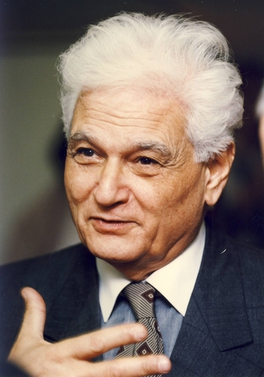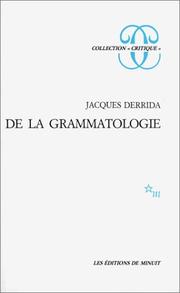 Cover of the first edition | |
| Author | Jacques Derrida |
|---|---|
| Country | France |
| Language | French |
| Subject | Philosophy |
| Published | 1972 |
| Media type | |
Positions is a 1972 book by the French philosopher Jacques Derrida.
 Cover of the first edition | |
| Author | Jacques Derrida |
|---|---|
| Country | France |
| Language | French |
| Subject | Philosophy |
| Published | 1972 |
| Media type | |
Positions is a 1972 book by the French philosopher Jacques Derrida.
Positions consists of a collection of interviews. Derrida talks about his earlier works and their relationships. He said that his 1962 essay, Edmund Husserl's Origin of Geometry: An Introduction , already contained many elements of his thought, that would be further elaborated. He added: "that essay can be read as the other side (recto or verso, as you wish) of Speech and Phenomena ." [1]
On the relationship between his three foundational works of 1967, Derrida explained: " Speech and Phenomena is perhaps the essay which I like most. Doubtless I could have bound it as a long note to one or the other of the other two works. Of Grammatology refers to it and economizes its development. But in a classical philosophical architecture, Speech... would come first: in it is posed, at a point which appears juridically decisive for reasons that I cannot explain here, the question of the privilege of the voice and of phonetic writing in their relationship to the entire history of the West, such as this history can be represented by the history of metaphysics and metaphysics in its most modern, critical and vigilant form: Husserl's transcendental phenomenology." [2]
Deconstruction is a loosely-defined set of approaches to understanding the relationship between text and meaning. The concept of deconstruction was introduced by the philosopher Jacques Derrida, who described it as a turn away from Platonism's ideas of "true" forms and essences which are valued above appearances.

Edmund Gustav Albrecht Husserl was an Austrian-German philosopher and mathematician who established the school of phenomenology.

Martin Heidegger was a German philosopher who is best known for contributions to phenomenology, hermeneutics, and existentialism. He is often considered to be among the most important and influential philosophers of the 20th century.

Jacques Derrida was an Algerian-born French philosopher. He developed the philosophy of deconstruction, which he utilized in a number of his texts, and which was developed through close readings of the linguistics of Ferdinand de Saussure and Husserlian and Heideggerian phenomenology. He is one of the major figures associated with post-structuralism and postmodern philosophy although he distanced himself from post-structuralism and disowned the word "postmodernity".

Emmanuel Levinas was a French philosopher of Lithuanian Jewish ancestry who is known for his work within Jewish philosophy, existentialism, and phenomenology, focusing on the relationship of ethics to metaphysics and ontology.
The Yale school is a colloquial name for an influential group of literary critics, theorists, and philosophers of literature that were influenced by Jacques Derrida's philosophy of deconstruction. Many of the theorists were affiliated with Yale University in the late 1970s, although a number of the theorists – including Derrida himself – subsequently moved to or became affiliated with the University of California, Irvine.

Jean Paul Gustave Ricœur was a French philosopher best known for combining phenomenological description with hermeneutics. As such, his thought is within the same tradition as other major hermeneutic phenomenologists, Martin Heidegger, Hans-Georg Gadamer, and Gabriel Marcel. In 2000, he was awarded the Kyoto Prize in Arts and Philosophy for having "revolutionized the methods of hermeneutic phenomenology, expanding the study of textual interpretation to include the broad yet concrete domains of mythology, biblical exegesis, psychoanalysis, theory of metaphor, and narrative theory."
Différance is a French term coined by Jacques Derrida. It is central to Derrida's concept of deconstruction, a critical outlook concerned with the relationship between text and meaning. The term différance means both "difference of meaning" and "deferral of meaning".
The following is a bibliography of works by Jacques Derrida.
"Structure, Sign, and Play in the Discourse of the Human Sciences" was a lecture presented at Johns Hopkins University on 21 October 1966 by philosopher Jacques Derrida. The lecture was then published in 1967 as chapter ten of Writing and Difference.

Jean-Luc Marion is a French philosopher and Roman Catholic theologian. Marion is a former student of Jacques Derrida whose work is informed by patristic and mystical theology, phenomenology, and modern philosophy. Much of his academic work has dealt with Descartes and phenomenologists like Martin Heidegger and Edmund Husserl, but also religion. God Without Being, for example, is concerned predominantly with an analysis of idolatry, a theme strongly linked in Marion's work with love and the gift, which is a concept also explored at length by Derrida.

Philosophical anthropology, sometimes called anthropological philosophy, is a discipline dealing with questions of metaphysics and phenomenology of the human person.
In modern usage, the term grammatology refers to the scientific study of writing systems or scripts. This usage was first elucidated in English by linguist Ignace Gelb in his 1952 book A Study of Writing. The equivalent word is recorded in German and French use long before then. Grammatology can examine the typology of scripts, the analysis of the structural properties of scripts, and the relationship between written and spoken language. In its broadest sense, some scholars also include the study of literacy in grammatology and, indeed, the impact of writing on philosophy, religion, science, administration and other aspects of the organization of society. Historian Bruce Trigger associates grammatology with cultural evolution.

Of Grammatology is a 1967 book by the French philosopher Jacques Derrida. The book, originating the idea of deconstruction, proposes that throughout continental philosophy, especially as philosophers engaged with linguistic and semiotic ideas, writing has been erroneously considered as derivative from speech, making it a "fall" from the real "full presence" of speech and the independent act of writing.
Trace is one of the most important concepts in Derridian deconstruction. In the 1960s, Jacques Derrida used this concept in two of his early books, namely Writing and Difference and Of Grammatology.

Speech and Phenomena: And Other Essays on Husserl's Theory of Signs, or Voice and Phenomenon: Introduction to the Problem of the Sign in Husserl's Phenomenology, is a book about the phenomenology of Edmund Husserl by the French philosopher Jacques Derrida, published in 1967 alongside Derrida's Of Grammatology and Writing and Difference. In Speech and Phenomena, Derrida articulates his mature relationship to Husserl, putting forward an argument concerning Husserl's phenomenological project as a whole in relation to a key distinction in Husserl's theory of language in the Logical Investigations (1900–1901) and how this distinction relates to his description of internal time consciousness. Derrida also develops key discussions of the terms deconstruction and différance. Derrida commented that Speech and Phenomena is the "essay I value the most". Derrida's best known work on Husserl's phenomenology, it is widely considered one of his most important philosophical works.

Writing and Difference is a book by the French philosopher Jacques Derrida. The work, which collects some of the early lectures and essays that established his fame, was published in 1967 alongside Of Grammatology and Speech and Phenomena.

Totality and Infinity: An Essay on Exteriority is a 1961 book about ethics by the philosopher Emmanuel Levinas. Highly influenced by phenomenology, it is considered one of Levinas's most important works.

Leonard "Len" Lawlor is Edwin Erle Sparks Professor of Philosophy at Pennsylvania State University. He specializes in nineteenth- and twentieth-century Continental philosophy.

Edward S. Casey is an American philosopher and university professor. He has published several volumes on phenomenology, philosophical psychology, and the philosophy of space and place. His work is widely cited in contemporary continental philosophy. He is currently Distinguished Professor Emeritus of Philosophy at Stony Brook University in New York and distinguished visiting faculty at Pacifica Graduate Institute.